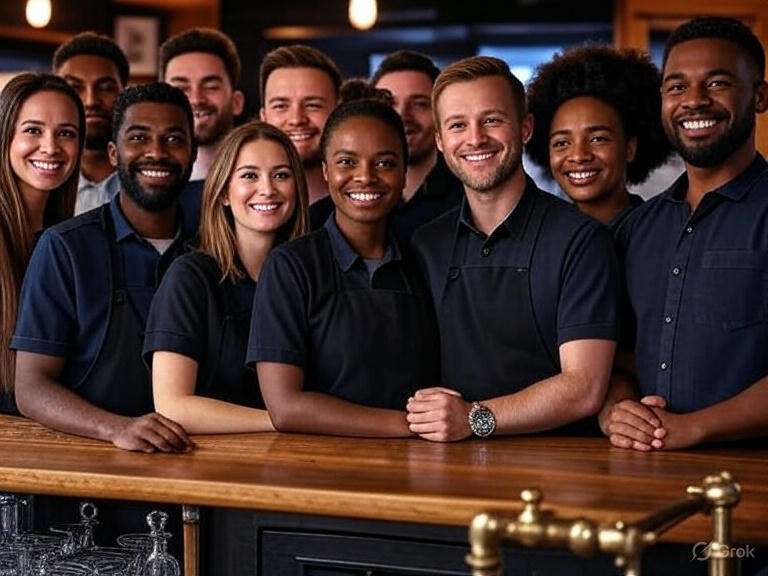Why Diversity and Development Matter in 2025
The pub trade is under pressure in 2025. Rising costs, staff shortages, and high customer expectations mean that landlords need every advantage. One of the most powerful tools available is diversity in the workplace. Pubs that value different backgrounds, perspectives, and skills are not just fairer — they are stronger.
At the same time, landlords must also focus on personal development plans (PDPs) and continuous professional development (CPD). These practices ensure that staff don’t just pour pints — they grow, improve, and feel invested in the pub’s success. When diversity and development combine, pubs see higher staff retention, better service, and stronger profits.
Diversity in the Pub Workplace
Diversity in the workplace means recognising, respecting, and valuing everyone as an individual. For pubs, this can mean employing staff of different ages, ethnicities, genders, sexual orientations, and abilities. It is about creating a team that reflects the wider community.
The UK’s Equality Act 2010 protects against discrimination based on age, disability, race, religion, sex, and sexual orientation. But legal compliance is only the starting point. Truly successful pubs go further — they build inclusive teams where everyone feels welcome and able to contribute.
According to the CIPD (Chartered Institute of Personnel and Development), organisations that embrace diversity and inclusion report higher levels of employee engagement and productivity. In pubs, this means better service, stronger teamwork, and a warmer welcome for customers.

The Business Case for Inclusion
Diversity isn’t just a “nice to have” — it is a clear business advantage. A 2023 McKinsey study found that companies in the top quartile for ethnic and gender diversity are significantly more likely to outperform financially. In hospitality, where customer experience is everything, inclusive teams deliver better results.
In pubs, inclusion translates directly into higher customer satisfaction. A multicultural team can better understand the needs of a diverse customer base. Younger staff may spot social media trends. Older staff may bring calm experience. Staff with different cultural backgrounds may suggest new drinks, events, or food ideas that attract fresh customers.
The British Beer and Pub Association (BBPA) has reported that pubs with a strong community focus — often built through inclusive staff practices — show greater resilience and higher repeat business. Inclusion is not just good ethics; it is good economics.
Personal Development Plans (PDPs) in Hospitality
A Personal Development Plan (PDP) is a structured way for individuals to reflect on their skills, set goals, and track progress. For pub staff, this could cover customer service, cellar management, marketing, or leadership skills.
A PDP helps staff see their role as more than just “pulling pints.” It gives them ownership of their learning and development. The FR3546a PDP guide highlights three key questions:
- Where am I now?
- Where do I want to be?
- How can I get there?
For landlords, encouraging PDPs is a smart move. It builds loyalty and shows staff you are invested in their careers. When employees grow, the pub grows with them.

Continuous Professional Development (CPD) in Pubs
While a PDP sets out goals, Continuous Professional Development (CPD) ensures progress over time. CPD is the process of tracking and recording the skills, knowledge, and experience gained both formally (training courses) and informally (on-the-job learning).
For pubs, CPD might include:
- Barista training for coffee service.
- Food hygiene and allergen awareness courses.
- Customer service workshops.
- Social media and event marketing training.
The key is that CPD is ongoing. Staff should not just attend one course and stop. Instead, they should review goals regularly, update their PDPs, and continue to grow. Research from Statista shows that employees who receive regular training are 24% more likely to stay in their jobs. Retention is vital in hospitality, where high turnover increases costs.
Inclusive Leadership in Pub Management
Diversity and CPD will only work if the landlord or manager leads by example. Inclusive leadership means listening to staff, valuing input, and creating an environment where everyone feels safe to contribute.
Practical steps for pub landlords include:
- Running staff meetings where all voices are heard.
- Offering flexible shifts where possible.
- Recognising and rewarding good performance.
- Supporting career progression through PDPs.
A study by Psychology Today found that inclusive leaders improve team performance by up to 30%. In pubs, that can mean quicker service, fewer conflicts, and happier customers.

Practical Framework for Landlords
Here’s a simple step-by-step model for pub landlords to apply:
- Review team skills – Identify current strengths and gaps.
- Set PDPs – Work with each team member to outline short, medium, and long-term goals.
- Encourage CPD – Fund training, encourage shadowing, and provide feedback.
- Foster inclusion – Build a workplace where everyone feels safe, respected, and valued.
- Track progress – Use tools like SmartPubTools to monitor engagement and performance.
This framework not only helps staff but also positions your pub as a great place to work — making it easier to attract and keep talent.
Case Study: How a PDP Changed a Pub Team
Imagine a medium-sized community pub with eight staff. The landlord noticed high staff turnover and low morale. Instead of recruiting endlessly, they introduced PDPs for each team member.
One bartender wanted to learn social media marketing. Another wanted cellar management training. A younger staff member wanted to train as a supervisor. By supporting these goals, the landlord built loyalty and reduced turnover by 40% in one year.
At the same time, the pub began promoting diversity more actively — hiring across a wider range of backgrounds. This helped attract new customers and created a friendlier atmosphere. Reviews improved, footfall increased, and profits followed.
Conclusion: The Future Belongs to Inclusive Pubs
The pubs that thrive in 2025 will be those that embrace diversity in the workplace, support personal development plans, and invest in continuous professional development. Inclusive teams deliver better service, stronger loyalty, and higher profits.
For landlords, the choice is clear: build a pub where everyone feels valued and supported. In return, you’ll attract great staff, loyal customers, and sustainable success.
Take the next step today — explore how SmartPubTools help you market your pub, for more success.